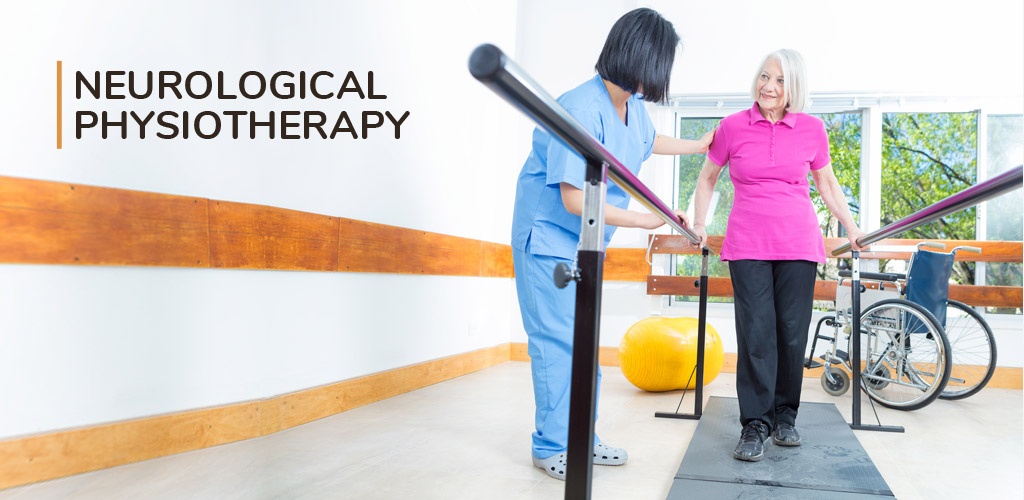Neurological Physiotherapy

What is Neurological Physiotherapy?
Neurological physiotherapy involves the treatment of people with movement and function disorders that have originated from problems within the body’s nervous and neuromuscular system. These conditions often manifest themselves as muscle weakness, poor balance and coordination, uncontrolled muscle spasm and tremors, loss of function and decreased sensation.


How Does Neurological Physiotherapy Work?
Neurological Physiotherapy is able to kick-start the message pathways that the Patient’s brain is struggling to use, to make new pathways through repetitive actions and exercises, in the guidance of Physiotherapist. Patients undergoing Neurological Physiotherapy can improve symptoms such as, difficulties with loss of balance, loss of hand and arm, or leg and foot function, walking, spasticity and pain. It is a process that centrally involves the patient in making plans and setting goals that are important and relevant to their own particular Neurological Issues.
Conditions Treated in Neurological Physiotherapy
Any neurological condition that affects movement and physical ability can be treated using neurophysiotherapy. Some common conditions in which this is useful include:
… Stroke Paralysis
… Parkinson’s Disease
… Bell’s Palsy
… Cerebral Palsy
… Multiple Sclerosis
… Traumatic Brain Injury
… Spinal Cord Injury
… Alzheimer’s Disease
… Guillain–Barre Syndrome (GBS)
… etc.


Benefits of Neurological Physiotherapy?
Neurological physiotherapy should commence as soon as possible following Injury or Disability for the best possible recovery. The treatment approach used varies depending on the individual, their symptoms and their goals. Neurological Physiotherapy treatment will help:
… Make movements easier to achieve
… Retrain Normal Patterns of Movement
… Increase Muscle Strength
… Increase Range of Movement
… Improve Motor Skills
… Improve posture & balance
… Reduce Muscle Stiffness
… Increase Fitness Levels and Endurance
… Reduce Risk of Falling
… Increase independence
… Improve ability with everyday activities
FAQ
What is Neurological Physiotherapy?
Neurological Physiotherapy is a specialized form of therapy focused on treating individuals with neurological conditions, such as stroke, multiple sclerosis, Parkinson’s disease, spinal cord injuries, and other disorders affecting the nervous system.
Who can benefit from Neurological Physiotherapy?
Individuals with conditions such as:
- Stroke
- Multiple sclerosis (MS)
- Parkinson’s disease
- Spinal cord injuries
- Traumatic brain injuries
- Cerebral palsy
- Neuromuscular disorders
What techniques are used in Neurological Physiotherapy?
Techniques may include:
- Motor retraining exercises
- Balance and coordination training
- Functional electrical stimulation (FES)
- Gait training
- Strengthening exercises
- Stretching and flexibility exercises
- Manual therapy techniques
How does Neurological Physiotherapy help in stroke recovery?
It helps by:
- Improving motor skills and coordination
- Enhancing balance and gait
- Reducing spasticity and muscle stiffness
- Promoting independence in daily activities
- Enhancing overall quality of life
What should I expect during my first session?
During your first session, the physiotherapist will:
- Conduct a thorough assessment of your condition
- Discuss your medical history and any specific concerns
- Set achievable goals tailored to your needs
- Develop a personalized treatment plan
How long does a typical Neurological Physiotherapy session last?
A typical session lasts between 45 minutes to 1 hour, depending on the individual’s needs and treatment plan.
How many sessions will I need?
The number of sessions varies based on the individual’s condition, progress, and specific goals. The physiotherapist will provide a tailored recommendation during the initial assessment.
Can Neurological Physiotherapy be done at home?
Yes, many exercises and techniques can be adapted for home use. The physiotherapist will provide guidance on home exercises to complement the in-clinic sessions.
Is Neurological Physiotherapy painful?
Neurological Physiotherapy aims to reduce pain and improve function. While some exercises may be challenging, they should not be painful. The physiotherapist will adjust the intensity to ensure comfort and safety.
How do I schedule an appointment for Neurological Physiotherapy?
Calling our clinic at

